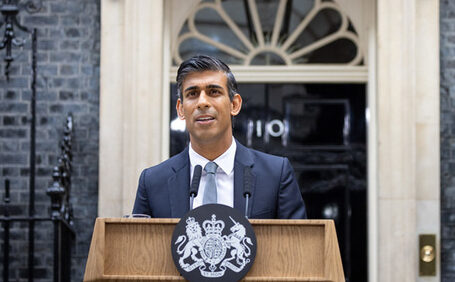Who is IQM?
IQM is the only national inclusion award in the UK. For over 20 years and in over 20 countries, schools, MATs and Local Authorities use the Inclusion Quality Mark to recognise exemplary inclusive practice.
Get in touch for your FREE school information pack today.
Will Rishi Sunak’s Plans Add Up to Success?
April 17, 2023

Rishi Sunak’s plan to make maths an essential skill has dominated the education news today. There’s no doubt the Prime Minister’s ‘maths to 18’ idea is an admirable target, but is it a step too far, can we afford to prioritise maths and numeracy over all other subjects?

‘Anti-maths mindset’
Explaining the UK possesses an inherent “anti-maths mindset” that is hampering efforts to improve numeracy, Rishi Sunak announced his maths review in a bid to make sure all pupils in England study the subject without the need to make it compulsory. The Prime Minister said the result would be students could bring maths into their everyday life allowing them to tackle number problems like calculating the angle of free kicks or the speed of a Formula 1 car.
Setting out plans for the expert-led review Rishi Sunak said ‘even just basic numeracy skills’ could increase earnings by around £1,600 a year.
“We’ve got to change this anti-maths mindset. We’ve got to start prizing numeracy for what it is – a key skill every bit as essential as reading,” he explained.
Sunak’s plans though have divided opinion. Peter Lampl, chair of the Education Endowment Foundation, welcomed the aspirations saying the focus should be “on giving young people the practical maths skills that they need in the workplace and in their everyday lives”.
In contrast, the Association of School and College Leaders said there was a “severe shortage of maths teachers”, and that the plan was “therefore currently unachievable”.
New Approach to Numeracy
As well as a new approach to numeracy, Rishi Sunak’s proposals include better attainment at primary schools and more technical education. Last year, only 59% of children leaving primary school in England reached the expected standards in reading, writing and maths. That is well below a target announced last year of 90% by 2030.

Many people believe children studying science, technology, engineering and maths (STEM) subjects are more likely to go into higher-paying careers than those studying the arts, humanities and other creative disciplines. Yet data from the British Academy suggests that this is not the full picture. While average salaries for arts, humanities and social science graduates are slightly below STEM graduates, the difference is minimal.
What’s more, over the first decade of their careers, arts graduates can progress just as quickly, with greater wage growth than doctors, for example. Importantly, creative subjects also give young people employability across a range of sectors. They learn creativity, communication skills, independence and adaptability – all of which are highly sought-after attributes in a world of constant change.
So how can we reform our children’s education for the better?
Surely reform is more achievable by putting the arts into STEM. This will give students, at all stages, the best possible chance of success. Increasingly, employers are seeking workers with finely tuned cognitive skills, the ability to think both critically and creatively, and the initiative and intuition to solve complex problems. These high-level abilities are inherent to creative education so its marginalisation risks disadvantaging the next generation, depriving them of the essential foundations our future workforce will require.

Creative roles already represent nearly a third of the government’s shortage occupation list, a proportion that will only grow if crucial interventions aren’t made to turbocharge our talent pipeline. Be it shortages in our fashion industry, or spiralling demands for programmers and coders, there are many gaps that must be plugged.
The UK’s creative sector is a global success story. Prior to the pandemic, employment in the creative industries grew at four times the rate of the UK economy and while UK employment fell in 2021, creative jobs grew by more than 5 %. If we are to sustain a high-growth trajectory and guarantee that UK creatives maintain their cutting edge in the face of international competition, it is paramount that we invest in getting the creative juices flowing in our young people.
Find out more about the IQM Inclusive School Award
If your school is interested in obtaining the IQM Inclusive School Award or you wish to talk to a member of the IQM team please telephone:
028 7127 7857 (9.00 am to 5.00 pm)
or email: info@iqmaward.com for further details.
Want more information on the IQM Award? Click here to request your free IQM information pack.
Other Posts

About IQM
The only national award for inclusion in the UK, IQM has been committed to recognising exemplary inclusive schools for over 20 years and in over 20 countries around the world. The three awards allow schools and organisations to celebrate their inclusive practice against nationally recognised framework.
Site Links
© 2026 Inclusion Quality Mark | website developed & cared for by digidoda


